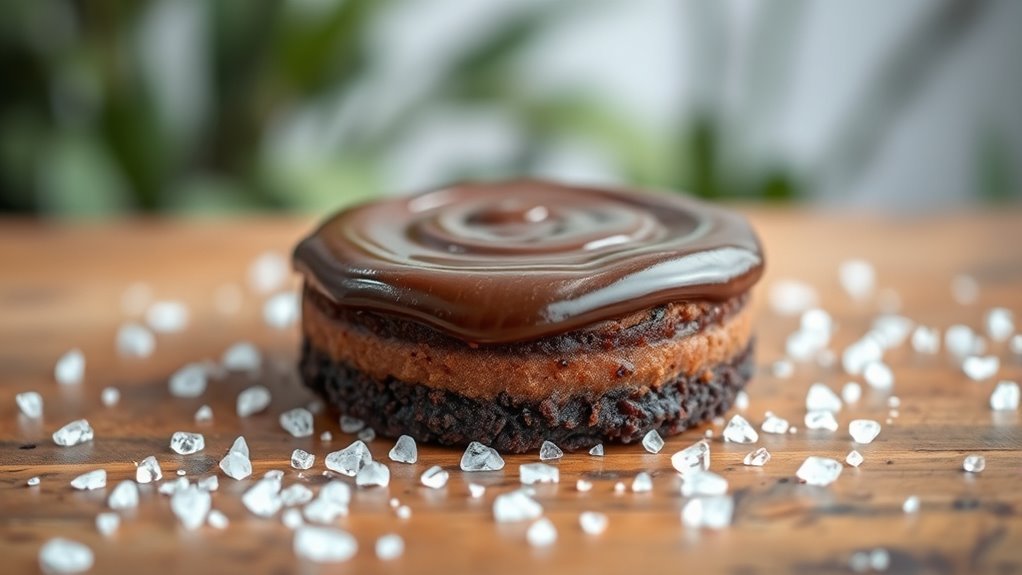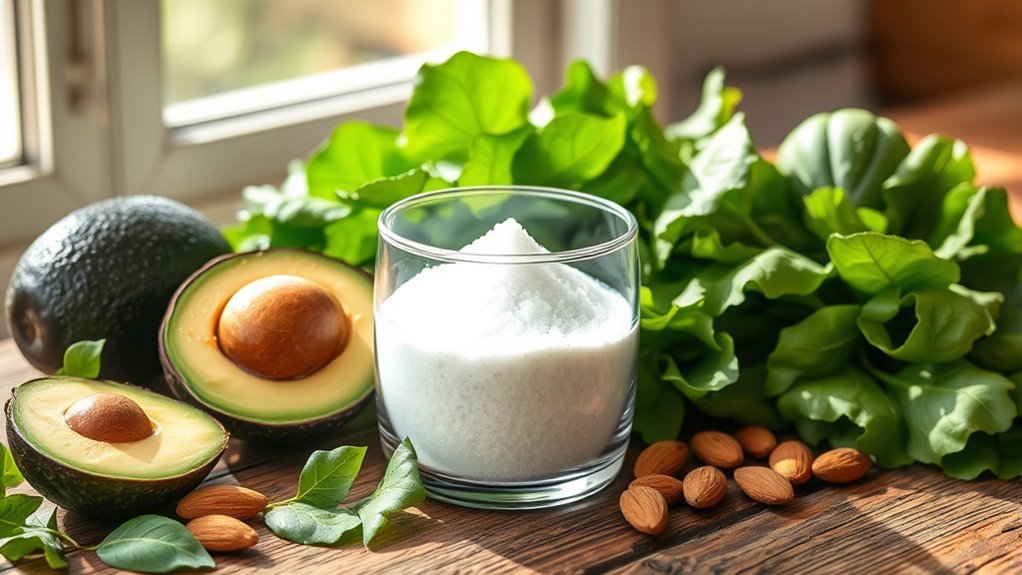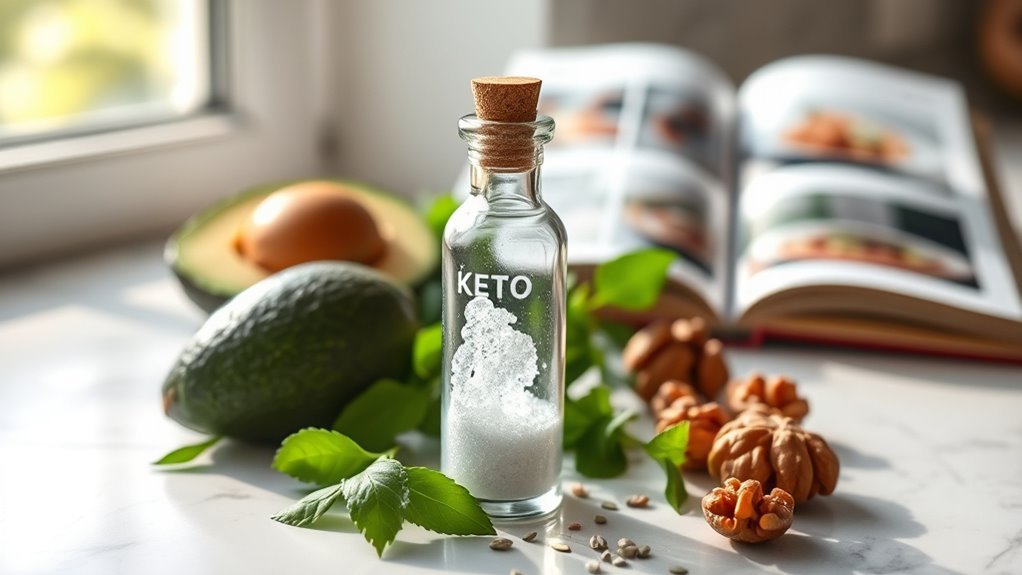Yes, sucralose is keto-friendly. It’s a zero-calorie sweetener that can satisfy your sweet cravings without adding carbohydrates, making it suitable for a ketogenic diet. Sucralose doesn’t impact blood sugar levels considerably and is about 600 times sweeter than sugar. However, some research suggests it may alter gut microbiota and appetite regulation. Keeping these factors in mind can help you make informed choices. There’s more to understand about this sweetener’s effects and practical uses.
What Is Sucralose?

Sucralose, a popular artificial sweetener, is derived from sugar through a chlorination process that alters its chemical structure. This transformation results in a compound that’s about 600 times sweeter than sugar, allowing you to enjoy sweetness without the added calories. One of the key sucralose benefits is its ability to help manage weight while satisfying your sweet cravings, making it a viable option for those on a keto diet or seeking to reduce sugar intake. You’ll find sucralose in a variety of products, including diet sodas, low-calorie snacks, and sugar-free desserts, which are commonly considered sucralose sources. Incorporating sucralose into your diet can provide a sense of freedom from traditional sugars while still allowing for enjoyable flavors. However, it’s important to note that some studies suggest artificial sweeteners can disrupt ketosis for certain individuals.
The Science Behind Sucralose

While many enjoy the sweetness of sucralose without the calories, understanding the science behind it is essential for making informed dietary choices. Sucralose is a chlorinated derivative of sucrose, which means your body doesn’t metabolize it like sugar. Instead, about 85% of sucralose passes through your system unchanged, limiting its impact on sucralose metabolism. This characteristic sets it apart from other artificial sweeteners, as it doesn’t contribute to blood sugar levels or insulin spikes. However, some studies suggest that chronic consumption of artificial sweeteners like sucralose may affect gut health and appetite regulation. Consequently, while sucralose offers a calorie-free alternative, being aware of its effects can empower you to make better choices aligned with your nutritional goals.
Sucralose and Ketosis

When considering a ketogenic diet, understanding the compatibility of sweeteners like sucralose is essential. Sucralose benefits include its zero-calorie content and ability to satisfy your sweet tooth without affecting your carbohydrate intake, making it appealing for those on keto. However, it’s important to weigh sucralose drawbacks, such as potential digestive issues for some individuals and concerns regarding its long-term effects on gut health. While sucralose may not directly impact ketosis, its artificial nature can lead to cravings for more sweet flavors, possibly derailing your diet. Ultimately, if you’re mindful of these factors, you can enjoy sucralose as a part of your ketogenic lifestyle, but staying informed will help you make the best choices for your health and freedom.
Impact on Blood Sugar Levels
When considering sucralose on a keto diet, it’s vital to examine its effects on blood sugar and insulin levels. Research indicates that sucralose generally has minimal impact on blood glucose, making it a popular choice for those monitoring their carbohydrate intake. However, understanding its broader metabolic effects is important for making informed dietary decisions. Additionally, some individuals may experience variations in their response to sweeteners, highlighting the importance of regular blood sugar monitoring to gauge personal tolerance and effects.
Blood Sugar Response
Understanding how sucralose affects blood sugar levels is essential for those following a keto diet, especially since maintaining stable blood sugar is a key aspect of this lifestyle. Research indicates that sucralose doesn’t greatly impact blood sugar regulation, making it a viable option as a sweetener alternative. However, individual responses can vary.
Here are some important points to take into account:
- Sucralose has a low glycemic index.
- It contains zero calories, which can support weight management.
- It doesn’t raise blood sugar levels in most individuals.
- It may alter gut microbiota, affecting overall health.
- Always monitor your body’s response to any sweetener. Additionally, artificial sweeteners like sucralose can provide a sweet taste without the carbs that disrupt ketosis.
Insulin Levels Effect
While sucralose is often praised for its low glycemic index and minimal impact on blood sugar levels, its effect on insulin levels is a critical consideration for those on a keto diet. Some studies suggest that sucralose may influence insulin sensitivity, which might have long-term effects on metabolic health.
| Aspect | Consideration |
|---|---|
| Insulin Response | Minimal compared to sugar |
| Potential Concerns | May affect insulin sensitivity |
| Long-Term Effects | Unclear; more research needed |
As you navigate your keto journey, understanding how sucralose interacts with your insulin levels can empower you to make informed choices. It’s essential to monitor your body’s response and consider potential long-term effects on your health.
Metabolic Impact Analysis
Although many people turn to sucralose as a sugar substitute on their keto journey, its impact on blood sugar levels deserves careful examination. Research indicates that sucralose has a glycemic index of zero, suggesting it doesn’t greatly affect blood sugar. However, its metabolic pathways may provoke different responses in individuals.
Here are some key points to reflect on:
- Sucralose doesn’t raise blood glucose levels.
- It’s generally safe for those managing diabetes.
- Some studies suggest it might alter gut microbiota.
- Individual responses can vary greatly.
- Long-term effects require further research.
Understanding these aspects will help you make informed choices about sucralose in your keto lifestyle, ensuring you maintain ideal metabolic health while enjoying sweet flavors.
Insulin Response to Sucralose
When considering the insulin response to sucralose, it’s important to examine the findings from insulin secretion studies. Research suggests that sucralose may not trigger a significant insulin release, which can be essential for those on a ketogenic diet. Understanding the metabolic effects of sucralose can help you make informed choices about its inclusion in your diet.
Insulin Secretion Studies
Understanding how sucralose affects insulin secretion is vital for those following a ketogenic diet. Research indicates that sucralose may have varying effects on insulin sensitivity and glucose metabolism. Here are some key points to take into account:
- Sucralose doesn’t spike blood glucose levels, making it appealing for keto followers.
- Some studies suggest it might trigger insulin release in certain individuals.
- Individual responses can vary based on personal insulin sensitivity.
- Understanding your body’s response is essential for maintaining ketosis.
- Further research is needed to draw definitive conclusions.
Metabolic Effects Overview
While sucralose is often viewed as a safe alternative sweetener for those on a ketogenic diet, its metabolic effects, particularly regarding insulin response, warrant careful consideration. Research indicates that sucralose may influence metabolic pathways, potentially affecting your insulin sensitivity. Some studies suggest that consuming sucralose can lead to a slight increase in insulin levels, which could impact your body’s ability to enter or maintain ketosis. Additionally, the effects on energy expenditure are still debated, with some evidence pointing to a negligible impact. If you’re committed to optimizing your ketogenic lifestyle, it’s crucial to evaluate how sucralose fits into your dietary choices. Understanding these metabolic effects can empower you to make informed decisions that align with your health goals.
Comparing Sucralose to Other Sweeteners
Although many sweeteners are marketed as low-calorie or keto-friendly, sucralose stands out due to its unique properties and potential health implications. When comparing sucralose to other sweeteners, consider the following:
- Caloric Content: Sucralose is a zero-calorie artificial sweetener, unlike some natural sweeteners.
- Sweetness Level: It’s about 600 times sweeter than sugar, requiring less for the same sweetness.
- Blood Sugar Impact: Sucralose doesn’t spike blood sugar levels, making it suitable for keto diets.
- Taste Profile: Some people find it has a more sugar-like taste compared to other artificial sweeteners.
- Usage Versatility: It’s heat-stable, making it suitable for baking and cooking.
Potential Health Concerns
As you consider incorporating sucralose into your keto diet, it’s crucial to be aware of potential health concerns associated with its consumption. Research suggests that while sucralose is generally recognized as safe, some studies indicate possible health risks, particularly with long-term effects. For example, it may alter gut microbiota, potentially impacting metabolism and overall health. Additionally, some individuals report gastrointestinal discomfort after consuming sucralose, which could affect your dietary experience. Although these findings aren’t definitive, they highlight the need for caution and self-monitoring. It’s crucial to evaluate how your body responds to sucralose and stay informed about ongoing research regarding artificial sweeteners in your keto lifestyle. Your health should always be a priority when making dietary choices.
Incorporating Sucralose Into a Keto Diet
When considering how to incorporate sucralose into your keto diet, it’s important to recognize both its potential benefits and the need for moderation. Sucralose can add sweetness to your meals without impacting your carb intake. Here are some tips to enjoy it in your keto lifestyle:
- Experiment with sucralose recipes for low-carb treats.
- Use it in keto desserts like cheesecake or brownies.
- Add a sprinkle to your morning coffee or tea.
- Combine it with healthy fats in smoothies for a satisfying snack.
- Keep an eye on your overall sweetener intake to maintain ketosis. Additionally, consider using sucralose in low-carb alternatives to traditional recipes, enhancing your desserts while keeping them keto-friendly.
Frequently Asked Questions
Can Sucralose Cause Digestive Issues on a Keto Diet?
Sucralose can cause digestive issues for some people on a keto diet, especially if you’ve got sucralose sensitivity. You might experience bloating, gas, or even diarrhea, disrupting your keto digestion. It’s essential to listen to your body; if you notice discomfort, reducing or eliminating sucralose might be wise. Always focus on what feels right for you, balancing enjoyment and health while steering your dietary choices in a way that feels liberating.
Is Sucralose Safe for Long-Term Consumption?
Sucralose can be safe for long-term consumption, but it’s essential to evaluate your overall long-term health. While it’s generally recognized as safe, some studies suggest potential digestive issues and impacts on gut health. If you’re looking for sweetener alternatives, contemplate options like stevia or erythritol, which may offer better health profiles. Always listen to your body and monitor how you feel with any sweetener you choose, ensuring it aligns with your dietary goals.
How Does Sucralose Taste Compared to Sugar?
Sucralose is notably sweeter than sugar, with a sweetness comparison that’s about 600 times greater. While sugar offers a familiar, rounded sweetness, sucralose has a cleaner flavor profile, lacking the calories and carbohydrates. Some people notice a slight aftertaste, especially at higher concentrations. If you’re seeking sugar alternatives, it’s essential to reflect on how these differences might affect your palate and overall experience with your favorite foods and beverages while maintaining nutritional balance.
Are There Any Natural Alternatives to Sucralose?
Yes, there are natural alternatives to sucralose, such as stevia and monk fruit. Notably, studies show that stevia can be up to 300 times sweeter than sugar, offering you a flavorful option without extra calories. Stevia benefits include potential blood sugar regulation and antioxidant properties. Monk fruit, another excellent choice, has zero calories and doesn’t affect insulin levels, making it perfect for your health-conscious lifestyle. You’ve got some great options!
Can I Use Sucralose in Baking?
Yes, you can use sucralose in baking! It’s a popular sugar substitute that can replace sugar in many recipes. When you’re baking with it, remember to adjust your liquid ingredients since sucralose is much sweeter than sugar. Also, consider using baking tips like increasing your oven temperature slightly for ideal results. Just keep in mind that while it works well, the texture might differ slightly from traditional sweeteners. Enjoy your baking freedom!
References
- https://www.ncbi.nlm.nih.gov/pmc/articles/PMC7037130/
- https://www.healthline.com/nutrition/sucralose-sweetener
- https://www.webmd.com/diet/obesity/news/20200914/sucralose-what-to-know-about-the-sweetener
- https://www.cdc.gov/nutrition/data-statistics/know-your-limit-for-added-sugars.html
- https://www.sciencedirect.com/science/article/abs/pii/S0271531721005465
- https://www.livescience.com/health/what-is-sucralose
- https://www.fda.gov/food/food-additives-petitions/sucralose-0
- https://www.usda.gov/food-nutrition/food-safety-education/sucrose-sweeteners
- https://www.who.int/news-room/fact-sheets/detail/healthy-diet


